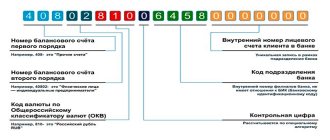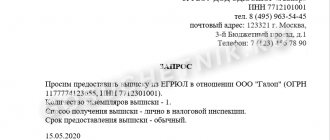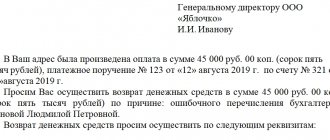In simple words about unlocking
The seizure of non-cash funds means that the company will not be able to make payments until the sanctions are lifted. The movement of money either stops completely or extends to a certain amount. In the second case, the organization will only be able to spend money in excess of the blocked amount. Seizure of funds does not apply to the following payments:
- according to executive documents;
- on wages;
- current payments, debts on taxes, fees, insurance premiums.
The company will be able to carry out such expense transactions even if the current account is blocked.
Algorithm of actions to unblock an account:
1) Provide all documents at the bank’s request and hand them over to employees according to the inventory or transfer acceptance certificate;
2) If your access to remote banking services has not been restored, write a written complaint and send it to the bank;
3) If after the claim the RBS was not restored to you, contact the interdepartmental commission created under the Central Bank of the Russian Federation;
4) If appealing to the interdepartmental commission does not help, then you need to file a claim with the Arbitration Court at the location of the bank or its branch.
If your bank card opened for an individual has been blocked. face read how to unlock it in this article.
I hope the information provided will be useful for you, do not forget to subscribe to the channel in order to regularly improve your legal literacy.
Situation No. 1: “We’ll transfer dubious money, but keep 10-20% for ourselves”
The above procedure. But the logic is simple and smacks of nonsense: “You launder proceeds through criminal means and look like a terrorist, but so be it, we will transfer your criminal money to another bank. Just give us 10-20% of the amount.” Sometimes banks don’t even inform you about the “special” tariff. They keep silent... Or they write it in small print in the banking service agreement. Therefore, read the contract carefully. What do the courts think?
- If the bank did not notify the client about special tariffs, did not indicate which transactions it considered suspicious, and did not make a request for explanations and documents, then the bank’s actions in charging a commission are illegal: Resolution of the Moscow District Court of August 24, 2018 in case No. A40 -201153/17. Just read these lines: “The court concluded that, by writing off the disputed funds, the Bank illegally usurped the functions of a government body and established a fee not provided for by law and agreement in the form of a “protective tariff” for conducting banking operations without providing documents, which is contrary the meaning of Federal Law No. 115-FZ “On combating the legalization (laundering) of proceeds from crime and the financing of terrorism .
- Increased commissions are not a form of control, even if this is provided for in the contract: Resolution of the Far Eastern District Court No. F03-3404/2018 dated August 27, 2018 in case No. A73-18762/2017. The enterprising bank, of course, in the fight against terrorism, stipulated in the contract individual conditions for suspicious clients: a commission of 12% when closing an account. The court put the bank in its place, and the businessman returned his honestly earned money: “Law No. 115-FZ, as well as other federal laws, does not contain provisions allowing credit institutions to establish a special commission as an anti-money laundering measure. in an increased size. Collection of a commission for transactions with funds related to the legalization (laundering) of proceeds from crime and the financing of terrorism is not a form of control.”
Situation No. 2: “We will limit access to the Internet bank without requesting documents”
A bank employee calls and says: “We have grounds to block your account under No. 115-FZ . Provide us with documents confirming the legality of the operation.” Or tells you the same thing when you come to the bank. What will you do: run to collect papers or ignore the demand? The bank's requirement in this form is contrary to the law. The bank is obliged to request documents in the following ways:
- “by delivering to the Client or his Representative a request drawn up on paper, certified by the signature of the Authorized Person and the seal of the Bank (branch), containing a list of necessary documents and the period within which the documents must be submitted to the Bank;
- by sending a similar request to the Client via electronic communication channels (if the form of contractual relations with the client involves the exchange of electronic messages)" ( clause 8.2.2. "Model Rules of Internal Control of a Credit Institution", approved by the Regulations of the Bank of Russia dated March 2, 2012 year No. 375-P )
A similar situation occurred in the Resolution of the Moscow District Court of August 13, 2018 in case No. A40-227570/2017. Of course, the businessman won: a telephone request is not a request. Therefore, the bank’s actions to restrict access to the Internet bank are illegal.
Situation No. 3: A “terrorist” is someone who transfers money between his accounts.”
Bank “A” offered you more attractive terms of service than bank “B”. And you decided to open a current account in bank “A”. Bank “B” was notified about the termination of the contract and the transfer of money to a new current account. Who are you after this? Of course, it's a "terrorist". Justify “why - why - how” and bring a suitcase of documents. And anyway, how could you do this, you bastard! Or, your company, which has an account in bank “A”, transfers you money to your “physicist” account in the same bank. Or your company has 2 current accounts in different banks. There are definitely “terrorist” notes...
In all the described cases, there is a risk of blocking if you do not justify the economic meaning of the transactions and provide supporting documents. Although, the bank can find 1000 and 1 reasons to still add you to the ranks of dangerous clients... All that remains is the court. And the courts support businessmen. For example, in the Resolution of the Arbitration Court of the North-Western District dated June 13, 2018 in case No. A56-51915/2017, the court stated: “Since, according to the evidence presented in the case, the Company explained to the Bank the economic meaning of the operation being carried out and provided supporting documents, the refusal to carry out the controversial operation on the grounds of paragraph 11 of Article 7 of Law No. 115-FZ, in the absence of evidence of the Bank’s compliance with the requirements of paragraphs 2, 3 of Article 7 of Law No. 115-FZ, the courts rightfully declared illegal and unfounded.” A similar situation occurred in the Resolution of the Moscow District Court of July 25, 2018 in case No. A40-173510/2017.
Former employee of one of the large banks:
- I worked in a large bank in Russia for more than 4 years as a manager of VIP clients, and during this time I saw enough of everything (I mean negative situations with clients).
But the most difficult situations are precisely the blocking of accounts of individuals engaged in entrepreneurial activities. They were not saved even by the fact that they had service packages open for privileged clients, which allowed them to withdraw millions of sums from their accounts and cards.
BUT!!! As soon as funds began to flow on their cards, even within the limit, their accounts were immediately blocked! Naturally, the question arises: why then do banks allow clients to open platinum cards for large amounts if these cards and accounts are immediately blocked? And then clients cannot “get” their money out of their accounts for months, because... For this you need permission from the Rosfinmonitoring service! The financial monitoring service requires supporting documents about the client’s financial activities, the client provides them... But the saddest thing is that the accounts remain frozen.
It's a vicious circle... Once you get there, you can't get out. In my practice, not a single client’s account has ever been unblocked and not a single client has been excluded from the so-called “STOP LIST”, except for one person: a friend of the bank manager (there are still loopholes for such “friends”). It is not surprising that the bank has lost many important clients, but the reality today is what it is...
Situation No. 4: “We will not unblock the current account / we will charge a commission / we will refuse banking services for an incomplete set of documents, or for conflicting information”
If the documents are indeed fakes, contain gross irregularities in their design, and do not fully reflect the essence of the transactions, then you will definitely be denied service. As happened in the Resolution of the Central District Court of August 1, 2018 in case No. A36-14507/2017. The bank conducted a study not only of documents, but also of the activities of the client’s employees. The general director is on maternity leave, but he signed the documents. Is that possible? No, unless there is a corresponding statement. After all, according to Art. 256 of the Labor Code of the Russian Federation , while on maternity leave, a woman can work part-time or at home only upon application.
And the documents are a mess: contracts for the provision of information and consulting services without attachments, identical loan agreements with “physicists” of non-identical content: different conditions and details, changed dates. In addition, the company did not pay taxes and insurance premiums. The bank refused service and terminated the contract. The court agreed: “Transfer of funds between their accounts for subsequent transfer of funds to the accounts of individuals, issuance of loans to individuals, lack of evidence of the return of funds by borrowers within the prescribed period, failure to provide the requested information, documents confirming the payment of personal income tax, insurance premiums, taxes, the presentation of documents containing contradictory information indicates that the client’s transactions fall under the criteria confirming the possible legalization (laundering) of proceeds from crime...”
And the commission will be charged for contradictory documents if the contract stipulated special tariffs and conditions for closing a current account. And in requests for the provision of documents, they will not forget to refer to the corresponding clause of the contract: Resolution of the Moscow District Court of July 17, 2018 in case No. A40-126172/2017.
The commission can also be withheld for an incomplete set of documents: Resolution of the Moscow District Court of August 15, 2018 in case No. A40-215812/2017. The court considered the 20% commission to be completely legal, since it was provided for in the contract.
By the way, sometimes a link to an incomplete set of documents does not work if the client actually provided the set that the bank requested. But the bank, either due to its inattention or harmfulness, still did not retreat. You can’t do this - the client is right. The businessman turned out to be very attentive and meticulous in Resolution of the Eighteenth AAS No. 18AP-10806/2018 dated August 23, 2018 in case No. A76-3461/2018 . Won.
In what cases are funds blocked?
Suspension of the movement of non-cash funds of an organization is actively used by the Federal Tax Service as one of the methods of ensuring the fulfillment of taxpayer obligations. Before writing a letter to the tax office about canceling the blocking of an account, it is necessary to determine the reason for what happened. All reasons for the seizure of non-cash money are listed in Article 76 of the Tax Code of the Russian Federation:
- taxes, fees, penalties, fines have not been paid upon request;
- the tax return has not been submitted;
- the receipt of the request or notification from the Federal Tax Service has not been submitted.
Read more: Why the tax office blocks an account
Let's sum it up
- If the bank has suspicions regarding a payment or the client’s activities, it has the right to suspend operations until the circumstances are clarified, block the account, and refuse to conclude an agreement.
- We have provided a list of possible unpleasant situations with the bank and ways to solve them in this article.
- We talk about how a client can convince a bank of his integrity and what those who are on the “black lists” of Rosfinmonitoring should do in this material.
What need to do
If the decision is made lawfully, eliminate its reasons, that is:
- list your tax debt;
- submit a declaration;
- send a receipt for the demand (notification) and the response to it.
To speed up the unblocking, send a letter to the tax office about unblocking non-cash transfers - address it to the Federal Tax Service at the place of registration and attach documents confirming the elimination of the violation.
Example of a letter about blocking removal
| To the Interdistrict Inspectorate of the Federal Tax Service No. 10 for St. Petersburg 190103, St. Petersburg, Lermontovsky pr-kt, 47, letter A (name of the tax authority that drew up the act and its address) from LLC "Company", TIN 7811111111 190000, St. Petersburg, Mira st., 5 (name of the person filing the objection, TIN (if any), address of his place location or place of residence) Letter to unblock a current account By decision No. 111 of February 10, 2019, the Ministry of Taxation and Taxation No. 10 for St. Petersburg made a decision to suspend the flow of funds due to our failure to file a VAT return for the 4th quarter of 2022. We inform you that on 02/11/2019 we submitted a VAT return for the 4th quarter of 2022. Thus, we have completely eliminated the tax violation. We ask you to remove the blocking of our current account due to the complete elimination of the violation. Applications:
General Director Savvateev Savvateev S.S. LLC "Company" February 11, 2022 |
When the account is unblocked
Having received an application from the taxpayer to remove the restriction from the current account, the Federal Tax Service will check whether the reasons for the blocking have been eliminated and make a decision on lifting the restrictions. This will happen no later than the next day after the actual fulfillment of the requirements.
If the taxpayer decides not to agree with the demands of tax officials and appeals the decision, the procedure may be delayed. According to the law, 15 days are given to consider a complaint filed administratively, and if this does not give the desired result, you will have to appeal the decision in court, and the consideration of the case will take longer.
Even after making a decision to lift the restrictions, the tax office will not be able to automatically unblock the account. She needs to send a corresponding request to the bank. In most cases, the credit institution receives data from the Federal Tax Service in electronic form, and the blocking is lifted the next day after the decision is made. But sometimes the bank has to wait for the original decision, for example, due to technical problems, and in this case the account is unblocked only after 5 days allotted for delivery of the original.
Vitalina Slepukhova One of the leading journalists of the project. In the credit sector since 2008. Has a higher education with a degree in Banking. Published in the online edition of the Kommersant newspaper. Extensive experience in the financial sector helps to navigate the microfinance and banking services market and see the most important events.
(13 ratings, average: 4.8 out of 5)
What to do if cash flow is stopped illegally
Unfortunately, situations of illegal suspension of the movement of money by the Federal Tax Service are not uncommon. In this case, only a complaint to the Federal Tax Service to block the current account will help, because there is no violation on the part of the taxpayer, and, accordingly, there is nothing to eliminate. This is possible if payments were incorrectly recorded in the Federal Tax Service system by mistake or the submission of reports was not reflected due to a software error. Objections are drawn up in any form and sent by letter.
Example of an objection letter
| To the Interdistrict Inspectorate of the Federal Tax Service No. 10 for St. Petersburg 190103, St. Petersburg, Lermontovsky pr-kt, 47, letter A from LLC "Company", TIN 7811111111 190000, St. Petersburg, Mira st., 5 OBJECTIONS on the decision to suspend the movement of funds On February 10, 2022, MIFTS No. 10 for St. Petersburg issued decision No. 111 to suspend the movement of funds of LLC "Company" on the current account opened with the NORTH-WESTERN BANK PJSC SBERBANK, St. Petersburg. The decision was sent to the named bank. The movement of funds through our current account has been suspended. Decision No. 111 states that the basis for its issuance is the failure of LLC “Company” to submit a VAT return for the 4th quarter of 2022. The deadline for submission is 01/25/2019. We inform you that LLC “Company” is not a payer of value added tax due to the fact that it applies the simplified tax system with the tax base “income minus expenses”. In the 4th quarter of 2022, we did not carry out any transactions that would entail the obligation to submit a VAT return. In this regard, we consider the decision made to suspend the movement of funds illegal. In connection with the above PLEASE: Cancel decision No. 111 of 02/10/2019 on the suspension of the movement of funds through the current account of LLC "Company" and send a notification about this to the NORTH-WESTERN BANK PJSC SBERBANK, St. Petersburg General Director Savvateev S.S. LLC "Company" |
If the inspectorate does not respond to objections when receiving a complaint to the tax office about blocking the account or responds negatively and does not unblock the money, the taxpayer remains to appeal the actions of the tax authorities to a higher organization. The actions of the Federal Tax Service can be appealed to the Office of the Federal Tax Service in your region.
Example of a letter of complaint about the actions of the Federal Tax Service
| To the Office of the Federal Tax Service for St. Petersburg 191180, St. Petersburg, emb. Fontanka River, 76 from LLC "Company", TIN 7811111111 190000, St. Petersburg, Mira st., 5 COMPLAINT on the actions of officials On February 10, 2022, MIFTS No. 10 for St. Petersburg issued decision No. 111 to suspend the movement of funds of LLC "Company" on the current account opened with the NORTH-WESTERN BANK PJSC SBERBANK, St. Petersburg. The decision was sent to the named bank. The movement of funds through our current account has been suspended. Decision No. 111 states that the basis for its issuance is the failure of LLC “Company” to submit a VAT return for the 4th quarter of 2022. The deadline for submission is January 25, 2019. We inform you that LLC “Company” is not a payer of value added tax due to the fact that it applies the simplified tax system with the tax base “income minus expenses”. In the 4th quarter of 2022, we did not carry out any transactions that would entail the obligation to submit a VAT return. In this regard, we consider the decision made to suspend the movement of funds illegal. On February 11, 2022, we submitted written objections to the decision made to the Federal Tax Service No. 10 for St. Petersburg, which sets out the arguments about the illegality of decision No. 111 of February 10, 2019. Despite this, to this day the decision has not been reversed, and the flow of funds through our current account has not been restored. In connection with the above, based on Articles 137 and 138 of the Tax Code of the Russian Federation, PLEASE:
General Director Savvateev S.S. LLC "Company" |
Examples of illegal blocking of a current account
Sometimes inspectors exceed their powers and block the accounts of organizations and entrepreneurs illegally. This happens when employees of the Federal Tax Service do not want to understand a situation that arose due to an ambiguous interpretation of a legal norm, a technical error in a document, or untimely actions of tax officials.
The current account is frozen before the end of the period for voluntary execution of the decision and the entry into force of the decision of the tax inspectorate
For example, an individual entrepreneur has not paid tax according to the simplified tax system. The Federal Tax Service sends a demand for payment, which must be executed within 10 days from the date of receipt. Often, already on the 8th or 9th day, the tax office suspends transactions on your bank account and cuts off your oxygen. Submit or send a tax application and indicate in it that transactions on the current account have been suspended in violation. Then the illegal arrest will be lifted.
Current account blocked for failure to submit reports to the Pension Fund
The pension fund does not have the right to suspend transactions on accounts. It is within his competence only to send a collection order to collect the arrears. If there are sufficient funds in the account, it is executed immediately, and if there is not enough money, it is executed as it arrives. If the Pension Fund of Russia has violated this rule, write an application to the head of the territorial department of the Pension Fund of the Russian Federation to cancel the blocking and file a claim with the arbitration court.
You did not submit a declaration to the Federal Tax Service on time due to the fault of a third party
If you sent the declaration on time, but it was not delivered: it was lost in the mail or a technical failure occurred - it is not your fault. Provide tax confirmation of the fact of sending, and the blocking will be lifted no later than the next business day. If it is not removed, you have the right to go to court.
Loan, deposit and other accounts that are not related to settlement and cash services have been blocked
The Federal Tax Service has the right to block only those accounts that are opened for the purpose of settlement and cash services for the organization. Credit, loan, deposit, and transit accounts are not subject to arrest.
The account is blocked based on the results of an on-site audit if the taxpayer has property or fixed assets
This is one of the preventive measures, its purpose is to collect as many taxes and fines accrued as a result of on-site inspections. To prevent an entrepreneur or organization from evading subsequent payments, the Federal Tax Service decides to block the current account.
The arrest is imposed on the payer’s funds in the amount of the debt to the budget identified during the audit. Tax authorities can apply this measure only if the organization does not have property with which to collect the debt, or if it is insufficient. In all other cases, blocking is illegal.
For example, an LLC owns 3 office premises and 2 vehicles. The total value of the enterprise's property is estimated at 17 million rubles. Based on the results of the on-site audit, the tax authority assessed additional VAT and income tax to the organization. The total amount of the identified arrears is 1.4 million rubles. After the inspection is completed, the servicing bank receives a request from the Federal Tax Service to impose a ban on debit transactions on the LLC’s current account in order to ensure the collection of arrears. This requirement is illegal, and here's why.
The organization's property - 17 million rubles - is quite enough to collect unpaid taxes, penalties and fines - 1.4 million rubles. The decision to suspend operations even in the amount of 1.4 million rubles contradicts the requirements of the law and violates the rights of the organization.
What to do if the blocking is initiated by the servicing bank
In addition to the tax office, in some cases the credit institution in which it is opened has the right to block money in a current account. To unblock the account, you will need to send an objection to the bank to block the account, because the company will not be able to use the money while the money is “frozen.” Banks are guided by the methodological recommendations of the Central Bank of the Russian Federation (18-MR dated July 21, 2017).
The credit institution suspends transactions if they seem suspicious to it. At the same time, absolutely ordinary operations are sometimes regarded as suspicious. For example, an organization transfers personal income tax and insurance premiums through one bank, but does not transfer salaries through this bank, because its salary project is open in another credit institution.
To remove the block in this case, you will need to send a letter to the bank when blocking the account. In the letter, provide reasoned arguments for the legality of the transactions with funds.
Example of a letter to a credit institution
| TO NORTH-WESTERN BANK PJSC SBERBANK, St. Petersburg from LLC "Company", TIN 7811111111 190000, St. Petersburg, Mira st., 5 OBJECTIONS on the decision to suspend the movement of funds On February 10, 2022, the bank suspended the execution of debit transactions on our current account. The reason for blocking was the lack of salary transfer operations. We would like to inform you that LLC “Company” has opened a salary project for VTB Bank (PJSC), within the framework of which wages are transferred to the organization’s employees. As confirmation, we provide statements and payment orders for the current account opened by LLC “Company” in the credit institution VTB Bank (PJSC). General Director Savvateev S.S. LLC "Company" |
If necessary, attach supporting documents to your application: payment orders from other credit institutions, loan agreements, etc. to quickly remove all blocks.
How to reduce the risk of blocking your current account
Any organization or entrepreneur may face blocking of their current account. If the inspector has seized the funds of a business entity legally, the taxpayer should eliminate the identified violation.
Sometimes the reasons for blocking are illegal, and then the organization will have to challenge the Federal Tax Service’s decision to suspend operations on the account in an arbitration court.
To minimize the risk of your current account being seized, we recommend following simple rules.
Tip No. 1. Monitor the work of the accountant
To minimize the likelihood of funds being seized, submit reports and pay taxes on time. If your accounting is carried out by a third-party accountant or outsourced firm, carefully select partners and monitor how your taxpayer obligations are fulfilled.
Tip No. 2. Manage current accounts through remote banking systems
A registered letter from the tax office about the suspension of transactions can take several days, or even weeks, and through banking systems you receive information about movements in the account and seizures immediately. By maintaining a remote connection with the bank, you will begin to resolve the problem faster.
Tip No. 3. Open several current accounts in different banks
Current accounts opened in different banks can simplify the life of the payer after the account is blocked. If one of them has enough funds to satisfy the claims of the tax authorities, the second will be unlocked upon your application, and you will be able to freely carry out monetary transactions through it.
Tip #4: Use available organization verification services
Make it a rule to regularly check your current accounts for arrests through the Federal Tax Service, especially before large receipts or write-offs. If you have lines of credit (overdrafts) open to your accounts, you should be especially careful to avoid defaulting on your loans due to a freeze.
What is a r/s arrest?
The seizure of current accounts involves the complete cessation of transactions involving the expenditure of funds in the account. It becomes impossible to withdraw or transfer money. At the same time, funds continue to arrive on the account in the standard mode. You can't just block an account. You need good reasons for this.
- Seizure may be imposed by the tax service. This is relevant if there are tax arrears, or the Federal Tax Service suspects that the sources of the funds being credited are illegal. The right of the tax service to block an account is set out in Article 72 of the Tax Code of the Russian Federation. This method is considered effective in influencing the debtor. The owner of the enterprise, under the threat of stopping all business processes, will have to pay all taxes.
- Another option for arrest is the presence of debt. Debt itself does not lead to blocking. Freezing of accounts is carried out on the basis of a writ of execution. You can get it through the court. Funds from the account are used to pay off existing debt. If funds are received into the account, they will also be used to offset the debt.
- The banking institution itself can block the account if there are factors indicating that the company is laundering funds. Reasons for suspicion may include large receipts in foreign currency, frequent transfers to individuals or other organizations, transfers to the accounts of persons whose activities are recognized as extremist or terrorist.
Grounds for suspending all expense transactions
One of the grounds for suspending expense transactions of an organization or individual entrepreneur is a tax return not completed on time.
Thus, after the completion period expires, a legal entity or individual entrepreneur is given another 10 calendar days to submit a declaration to the tax authority. If this has not been done, then the tax authority has the right to ask the bank to suspend all expense transactions, except those that are extraordinary.
This interim measure is specified in paragraph 3 of Article 76 of the Tax Code. In addition, if an organization or individual entrepreneur has not received or confirmed the fact of receiving from the tax authority all the documents necessary to fill out the declaration, then these documents are considered not accepted, and the declaration is not completed or filled out incorrectly.
This, in turn, also leads to the application of the provisions of Article 76 of the Tax Code. Namely, the suspension of any expenditure transactions.
Tax authorities send documentation to ensure that all items of the declaration are filled out correctly and reliably.
That is why payer organizations and individual entrepreneurs are required to notify the tax authorities of receipt of documents. Moreover, they can request clarifications and clarifications, which are provided by the tax authorities.
The most common grounds for suspending all expenditure transactions on the accounts of organizations or individual entrepreneurs are decisions of tax authorities aimed at paying arrears, paying taxes and fees, as well as fines and penalties to the state budget.
In this case, before a decision is made, a demand is sent to the payer-debtor, which specifies the terms and conditions for repayment of the debt. If this does not happen, then the head (or the person who performs his functions and powers) of the tax authority makes a decision to collect the missing funds by suspending operations on the account.
The measure is of an interim nature, allowing the state budget to be replenished exactly by the amount due from a specific payer, but no more.






